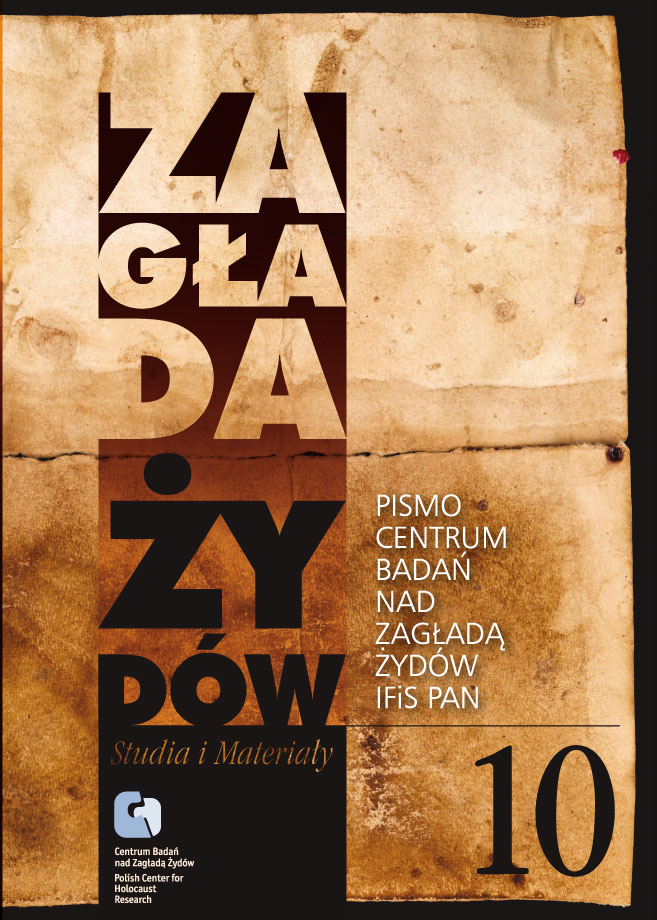Krzesiny i Kreising – między pamiętaniem a pomijaniem. Polskie miasteczko wobec historii, pamięci i rywalizacji w cierpieniu
Zagłada Żydów. Studia i Materiały, Nr 10 (2014), Strony: 443-461
Data zgłoszenia: 2020-10-22Data publikacji: 2014-12-01
 https://doi.org/10.32927/ZZSiM.532
https://doi.org/10.32927/ZZSiM.532
Abstrakt
The area around Krzesiny, located near the city of Poznań, Poland, witnessed several dark events during World War II: Germans oppressed the local population, culminating in a terrorizing action dubbed “akcja krzesińska;” also, a forced labor camp, named “Kreising,” was built near the township, housing mainly Jews. After the war, the suffering in Krzesiny was remembered, but selectively – “akcja” and other forms of Polish suffering were commemorated, while the camp was not. By exploring the “lieux de mémoire” in Krzesiny – dynamics of memory in a small township in Poland – this paper uses localized research to address the issue of gaps in collective memory and commemoration. We briefly look at the relevant history, Polish memory regarding wartime events in Krzesiny, and the postwar dynamics of collective memory. Discussing the latter, we identify a new phenomenon at work, one which we dub “collective disregard” – group neglect of the past of the “Other” that occurs without clear intent. We argue that “collective disregard” is an issue that naturally occurs in the dynamics of memory. By making a deliberate investment in balanced remembrance and commemoration, societies can counter the tendencies of “disregard” and curb the controversies of competitive victimization claims, also called “competitive martyrdom”.
Licencja
Prawa autorskie (c) 2014 Autor&"Zagłada Żydów. Studia i Materiały"

Utwór dostępny jest na licencji Creative Commons Uznanie autorstwa 4.0 Międzynarodowe.
https://creativecommons.org/licenses/by/4.0
Czasopismo publikowane jest w standardzie Diamond Open Access na licencji CC-BY-4.0 Deed - Uznanie autorstwa 4.0 Międzynarodowa - Creative Commons
Podobne artykuły
- Krzysztof Malicki, Pomiędzy niepamięcią a pamięcią ekskluzywną. Współczesny Rzeszów wobec swojej żydowskiej przeszłości , Zagłada Żydów. Studia i Materiały: Nr 17 (2021)
- Marta Duch-Dyngosz, W poszukiwaniu lokalnej pamięci o Zagładzie. Przypadek upamiętniania społeczności żydowskich w mniejszych miejscowościach we współczesnej Polsce , Zagłada Żydów. Studia i Materiały: Nr 17 (2021)
- Joanna Gubała-Czyżewska, Upamiętnienia Łodzi żydowskiej – w jaki sposób przeszłość uobecnia się w teraźniejszości , Zagłada Żydów. Studia i Materiały: Nr 16 (2020)
- Katarzyna Grzybowska, „Rowy leśne” i miejsca, których „w ogóle nie ma”. Harcerski Alert Zwycięstwa 1965 jako przyczynek do badania pamięci o Zagładzie , Zagłada Żydów. Studia i Materiały: Nr 18 (2022)
- Anna Ziółkowska, Dorota Sula, Żydzi polscy w Konzentrationslager Gross-Rosen [Anna Ziółkowska] , Zagłada Żydów. Studia i Materiały: Nr 17 (2021)
- Katarzyna Chmielewska, Pamięć wielokierunkowa i agoniczna a polityka pamięci , Zagłada Żydów. Studia i Materiały: Nr 17 (2021)
- Anna Ziółkowska, Medycyna obozowa. O tym jak chorowali, cierpieli i umierali żydowscy robotnicy w obozach pracy przymusowej w Poznaniu (1941–1943) , Zagłada Żydów. Studia i Materiały: Nr 8 (2012)
- Anna Styczyńska, „Nie powinniście postrzegać tego jako wyniku naszej lekkomyślności lub tchórzostwa”. Testamenty Fajwisza Kamlarza i Abrahama Zajfa, uczestników buntu w obozie pracy przymusowej dla Żydów w Koninie , Zagłada Żydów. Studia i Materiały: Nr 18 (2022)
- Johannes Breit, Lukas Meissel, Igraszki z symboliką Zagłady. Seria gier komputerowych „Wolfenstein” jako studium przypadku cyfrowych reprezentacji Zagłady , Zagłada Żydów. Studia i Materiały: Nr 17 (2021)
- Piotr Filipkowski, Między historią mówioną, psychologią ocalenia a traumą drugiego pokolenia. Wokół książek Mikołaja Grynberga Ocaleni z XX wieku i Oskarżam Auschwitz. Opowieści rodzinne , Zagłada Żydów. Studia i Materiały: Nr 11 (2015)
1 2 3 4 5 6 7 8 9 10 11 12 13 14 15 16 17 18 19 20 21 22 23 24 25 26 27 28 29 30 31 32 33 34 35 36 > >>
Możesz również Rozpocznij zaawansowane wyszukiwanie podobieństw dla tego artykułu.
 English
English
 Język Polski
Język Polski








